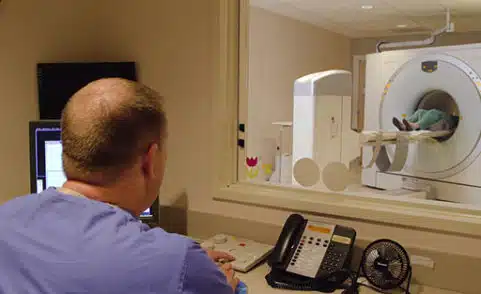
How to Find Answers to Sinus Problems with a CT Sinus Exam
At night, the cough that was annoying Maria Ocasio all day becomes painful. When she tries to sleep, persistent coughing leaves her out of breath and makes her lungs hurt. After weeks of living with it and thinking she’d get better on her own, Maria saw her doctor who sent her for an allergy study. But the results didn’t provide an answer as to the source of her problem. Next, her doctor sent Maria to RAYUS Radiology (RAYUS) to get a look at her sinuses with the help of a sinus CT exam.
Common symptoms that CT sinus can help diagnose
Stories like Maria’s are common says Jason Port, MD, medical director of RAYUS Springfield, MA. Oftentimes something that starts like a common cold can persist. Your symptoms might include nasal congestion, blocked nasal passages, thick postnasal drainage, sinus headaches, pressure, facial pain, or even a loss of your sense of smell.
After you’d expect a cold to run its course, and it hasn’t, you may end up in your doctor’s office like Maria. If the trial and error of different treatment options don’t make a difference, your doctor may recommend a CT sinus exam.
Matthew Marino, MD of ENT Associates in Chesterfield, MO outside of St. Louis specializes in nasal and sinus disorders. “Generally, those who get a sinus scan will be those who fail to respond to the medical treatment that we provide,” he explains. A CT sinus exam allows him to see what’s happening in your sinuses, which are located behind your nose, cheeks, eyes, and forehead. The answers he gets from a CT scan can be life-changing for patients. Dr. Marino recalls one case where a woman came to him unable to taste or smell. The CT sinus images guided his decision that surgery would help.
How a CT sinus scan helps patients
If you’re suffering from prolonged symptoms like those mentioned above, your first step is to see your doctor. Usually your primary care physician will order a CT sinus, but an allergist or ENT specialist can also order the scan. The exam is quick and comfortable. You’re on your back in the scanner for five minutes or less, and in that short amount of time, the images taken can give our radiologists and your doctor a lot of information. Dr. Port explains that when he’s interpreting the images for your doctor, he’s looking for things like a thickening of the lining of your sinuses. Here are some specific things our radiologists can see from your scan:
After your scan, we send the results back to your doctor along with our radiologist’s report of what we saw. Your doctor will talk to you about those results and help you decide your next best step for treatment. Sometimes that’s a change in how you’re managing your symptoms, like a change in medication. Other times, your doctor may suggest surgery. When Maria left RAYUS after her five-minute scan, she was feeling hopeful. Once her doctor could get a clear look at her sinuses, she would have answers that could help her finally treat the cough that was keeping her awake night after night.
About Dr. Port
Jason Port, MD, is a board-certified neuroradiologist at RAYUS Radiology (RAYUS) in Massachusetts. Read his full bio here.
